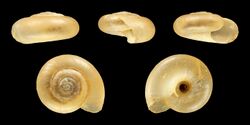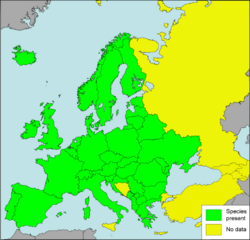Biology:Zonitoides nitidus
| Zonitoides nitidus | |
|---|---|

| |
| Two shells of Zonitoides nitidus | |
| Scientific classification | |
| Domain: | Eukaryota |
| Kingdom: | Animalia |
| Phylum: | Mollusca |
| Class: | Gastropoda |
| Subclass: | Heterobranchia |
| Order: | Stylommatophora |
| Superfamily: | Gastrodontoidea |
| Family: | Gastrodontidae |
| Genus: | Zonitoides |
| Species: | Z. nitidus
|
| Binomial name | |
| Zonitoides nitidus (Müller, 1774)[1]
| |
| Synonyms | |
| |
Zonitoides nitidus (sometimes Zonitoides nitida),[2] also known as the shiny glass snail or black gloss, is a species of small, air-breathing land snail, a terrestrial pulmonate gastropod mollusc in the family Gastrodontidae.[3]
It is the type species of the genus Zonitoides.
Distribution

Zonitoides nitidus has a Holarctic distribution. It is found in most of Europe, except the southernmost regions.[4]
- Czech Republic – least concern (LC)[5]
- Netherlands[6]
- Russia – Tver, Moscow, Novgorod, and Ulyanovsk[7]
- Ukraine[8]
- Slovakia
- Great Britain – north British highland zones and not in north Scotland.[4] In some regions in Britain the species has declined due to drainage.[4]
- Ireland
- Hebrides[4]
- Orkney[4]
- Shetland[4]
- rare in northern Greece[4]
- Canada
The non-indigenous distribution of this species includes:
- introduced to Menorca[4]
Description

The shell of Z. nitidus is reddish brown. The umbilicus is large: almost 25% of shell diameter. The shell has radial growth lines. It is wider than it is tall. It is 6–7 mm (0.24–0.28 in) wide and 3.5–4.0 mm (0.14–0.16 in) tall.[4]
The body of the adult animal is black with an orange dash: the (mantle gland is visible under the shell's aperture). Juveniles are whitish grey with light brown translucent shells.[4]
Ecology
Zonitoides nitidus occurs in wet meadows and river woods, usually near water bodies, swamps and swampy forests, in the zone of emergent vegetation.[4] Man-made habitats such as pools in old quarries are sometimes colonized after a few years.[4] In Switzerland it is found up to 2100m (6900 ft) of altitude.[4]
Zonitoides nitidus is largely herbivorous, but is malacophagous in summer.[9] Z. nitidus feed on disintegrating leaves, mushrooms, roots and fruit, but they do not eat dry leaves. When consuming soft food such as mushrooms or soft fruits, Z. nitidus penetrates perpendicularly inside; the entire animal including its shell can penetrate inside the fruit.[4] In summer, Z. nitidus prey upon snails and bivalves.[9][10]
In Germany up to three clutches of 2–9 eggs per individual are laid in all seasons, with some days or weeks spacing between egg-laying.[4] Egg diameter is 1.0–1.6 mm (0.04–0.06 in).[4] Eggs are laid loose into the soil.[4] Juveniles have 1.5 whorls (diameter 1–1.2 mm, 0.04–0.05 in) after hatching.[4] They start feeding on disintegrating plant remains in the soil.[4] After 3 months the shell diameter reaches up to 3 mm (0.12 in) under favourable conditions, after 10 months 6 mm (0.24 in), and full size after slightly more than one year.[4] Maximum age is 18 months under laboratory conditions.[4]
Parasites of Zonitoides nitidus include:
References
This article incorporates public domain text from the reference.[4]
- ↑ Müller O. F. 1774. Vermivm terrestrium et fluviatilium, seu animalium infusoriorum, helminthicorum, et testaceorum, non marinorum, succincta historia. Volumen alterum. pp. I-XXVI [= 1-36], 1-214, [1-10]. Havniæ & Lipsiæ. (Heineck & Faber).
- ↑ "Zonitoides nitida". Utah Division of Wildlife Resources. https://dwrcdc.nr.utah.gov/rsgis2/search/Display.asp?FlNm=zoniniti.
- ↑ "Zonitoides nitidus (O. F. Müller, 1774)". MolluscaBase. World Register of Marine Species. http://www.marinespecies.org/aphia.php?p=taxdetails&id=1050736.
- ↑ 4.00 4.01 4.02 4.03 4.04 4.05 4.06 4.07 4.08 4.09 4.10 4.11 4.12 4.13 4.14 4.15 4.16 4.17 4.18 4.19 4.20 4.21 "Species summary for Zonitoides nitidus". AnimalBase, last modified 29 August 2010, accessed 3 September 2010.
- ↑ Juřičková L., Horsák M. & Beran L. (2001). "Check-list of the molluscs (Mollusca) of the Czech Republic". Acta Soc. Zool. Bohem. 65: 25–40.
- ↑ "Anemoon > Flora en Fauna > Soorteninformatie". http://www.anemoon.org/anm/voorlopige-kaarten/landmollusken/wetenschappelijk/zonitoides-nitidus/.
- ↑ Shikov, Evgeniy V. (2013). "The penial stalk of the Zonitoides nitidus (O. F. Müller, 1774) (Gastropoda: Pulmonata: Gastrodontidae) spermathecal duct as an allosperm container". Folia Malacologica 21 (3): 121–125. doi:10.12657/folmal.021.015.
- ↑ Balashov I. & Gural-Sverlova N. 2012. An annotated checklist of the terrestrial molluscs of Ukraine. Journal of Conchology. 41 (1): 91–109.
- ↑ 9.0 9.1 Vareille-Morel, C.; Rondelaud, D.; Dreyfuss, G. (2002). "Experimental colonization of new habitats by Galba truncatula O.F. Müller (Gastropoda : Lymnaeidae) in central France and their susceptibility to experimental infection with the trematode Fasciola hepatica L.". Annales de Limnologie - International Journal of Limnology 38 (1): 35–40. doi:10.1051/limn/2002003.
- ↑ Rondelaud, Daniel; Vignoles, Philippe; Dreyfuss, Gilles; Mage, Christian (2006). "The control of Galba truncatula (Gastropoda: Lymnaeidae) by the terrestrial snail Zonitoides nitidus on acid soils". Biological Control 39 (3): 290–299. doi:10.1016/j.biocontrol.2006.07.015. Bibcode: 2006BiolC..39..290R.
- ↑ Olsson I.-M., Stéen M. & Mann H. (1993). "Gastropod hosts of Elaphostrongylus spp. (Protostrongylidae, Nematoda)". Rangifer 13(1): 53–55. PDF.
- ↑ Michigan Department of Natural Resources and Environment. "Brainworm". accessed 14 December 2010.
- Minato, H. (1988). A systematic and bibliographic list of the Japanese land snails. H. Minato, Shirahama, 294 pp., 7 pls.
- Riedel, A. (1995). Zonitidae sensu lato (Gastropoda, Stylommatophora) der Türkei. Übersicht der Arten. Fragmenta Faunistica, 38 (1): 1–86. Warszawa
- Sysoev, A. V. & Schileyko, A. A. (2009). Land snails and slugs of Russia and adjacent countries. Sofia/Moskva (Pensoft). 312 pp., 142 plates.
- Bank, R. A.; Neubert, E. (2017). Checklist of the land and freshwater Gastropoda of Europe. Last update: July 16, 2017
External links
- Reinhardt, O. (1877). Über japanische Hyalinen, unter Zugrundelegung der Sammlungen des Herrn Hilgendorf. Sitzungsberichte der Gesellschaft naturforschender Freunde zu Berlin. 1877: 89–97
- Pilsbry, H. A. (1902). New land mollusks from the Japanese Empire. The Nautilus. 16(4): 45–47; 16(5): 53–57
- Clessin, S. (1878). Nordschwedische Mollusken. Malakozoologische Blätter. 25: 67–79.
- Schileyko, A. A. & Rymzhanov, T. S. (2013). Fauna of land mollusks (Gastropoda, Pulmonata Terrestria) of Kazakhstan and adjacent territories. Moscow-Almaty: KMK Scientific Press. 389 pp[Usurped!]
- Didier, B. & Rondelaud, D. (1989). Première données sur le régime alimentaire de Zonitoides nitidus Müller (Mollusque Gasteropod Pulmone). Bulletin de la Société d'Historie Naturelle de Toulouse. 125: 111–118
- image of Zonitoides nitidus
Wikidata ☰ Q1532576 entry
 |

